Back in June, we sponsored UX Scotland, a 3-day conference for designers, researchers and other user-centred professionals. This was the first conference we’ve sponsored or exhibited at in person since 2019. So, we were very excited at the prospect of having a stand and getting to meet and chat with over 300 people.
Our team had a brilliant 3 days and we definitely achieved our primary aim for the conference; to provide our team with access to a great learning and development opportunity. But as a sponsor, we also had other aims. For example, we wanted to:
- Increase awareness of us as a company and the services we deliver
- Attract potential job applicants and partners
- Build our network of contacts
- Generate relevant leads.
As this was a UX conference, we thought the most effective way to achieve these aims was to use our sponsorship package to evidence our skills at stimulating interest, designing interactions, and ultimately delivering positive experiences to a broad range of people who all happen to be in the same space at the same time.
Embracing sustainability: Internal discussion and challenges
So, as soon as we knew we were sponsoring we got planning what we needed to do to make the most of this opportunity. At the same time as doing this, we were also having an internal discussion about sustainability. This involved:
- Defining what sustainability meant to us as a micro-business
- Analysing our current activities and suppliers
- Identifying things we should change or stop doing
- Identifying principles and factors that should influence future activities and purchasing decisions
- Discussing what else we could do and what impact this would have.
This was quite a big, and if we’re being honest, contentious topic. The reality of managing business objectives with sustainability objectives can be very challenging. Sometimes it even requires a sacrifice to be made on one front or the other. While promoting our business was the main goal of sponsorship, we knew that providing the typical merch would compromise our sustainability objectives. So we began debating, where do we draw the line on both sides? This posed the next unpalatable question … is it better to do nothing in terms of conference giveaways or printed literature, that 9 times out of 10 ends up in a bin post-conference?
Well, this would work from a sustainability angle, but it certainly wouldn’t from a business one. Our Managing Director was able to reframe the challenge by highlighting how it was our bread and butter to come up with creative solutions to challenging problems … so come on team … do better!
The creative challenge: Finding a sustainable solution
Given we were sponsoring three conferences in the coming months and this challenge was a great litmus test. We kicked things off with a brainstorming session to generate as many ideas in terms of what we could do. This produced a long list of ideas that were then assessed in terms of cost, potential impact, and sustainability. Not many made the cut … but there was one in particular that really stood out for all the right reasons:
- It was representative of us as a brand and stood for our vision and values
- It passed the sustainability test
- Even if you didn’t like it, you’d probably know someone who would
- If it didn’t work … we could always do something else (batches of brownies were the fallback!).
The significance of plants: Aligning with our values
And the winning idea was … to give away small potted plants instead of the traditional conference merchandise. As we thought this would delight attendees and leave an on-brand lasting impression. The decision was not only inspired by our commitment to sustainability but also by our love of plants – which can be seen through the variety (and size) of plants throughout our office. Some of these plants have been with us for over 10 years. In fact, the snake plants throughout our office were cuttings from our Managing Director Esther’s grandmother’s plants that she has had in her house for her whole life. On a deeper level, giving away plants also aligned with our overall company vision to “accelerate innovation, adoption, and growth.”
The final pillar of growth was obviously critical in the case of plants but also the most challenging one. With over 300 attendees to account for, we knew we had to have at least that many plants – which required a lot of care but also took up quite some space. This process also symbolised how we like to roll up our sleeves, start from scratch, and persevere in the face of a challenge.
Overcoming challenges and learning to pivot
We started to plan the logistics of the approach, using a variety of seeds that were either practical (small herbs that could be used in cooking) or fun and exotic (like a coffee plant and mini palms). However, our ambitions were met with a set of challenges. Some of the seedlings required 40 days to germinate while others were not receiving adequate sunlight to grow or were growing without pigment and wouldn’t survive. We also came to the realisation that some of the plants may be toxic to pets and that wasn’t a risk we’d be willing to take, even with adequate warnings.
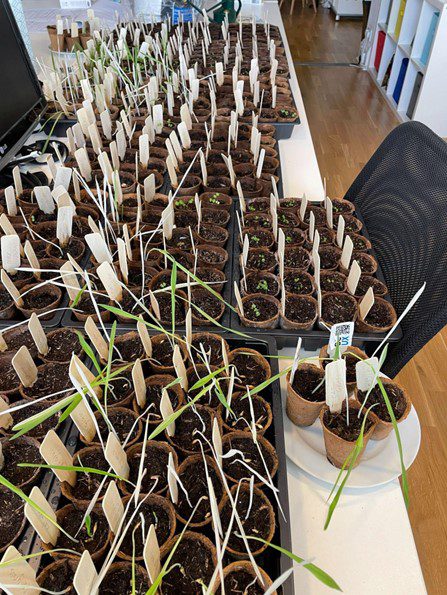
A few weeks out from the conference, we needed to create a backup plan as there was no way we were going to have enough seedlings ready (at least not for UX Scotland). We found a succulent supplier who was able to provide us with the required number of plants at short notice, though they did need potting. So we also acquired small ceramic pots that would be long-lasting and more sustainable alternatives to purchasing plastic pots. We also supplemented some geraniums for those who wanted more hardy outdoor plants and used fibre plant pots that could be planted directly into the soil.
Working throughout the weekend before the conference, we were able to pot more than 300 plants, even adding gravel to help capture moisture in the air and retain it in the soil.
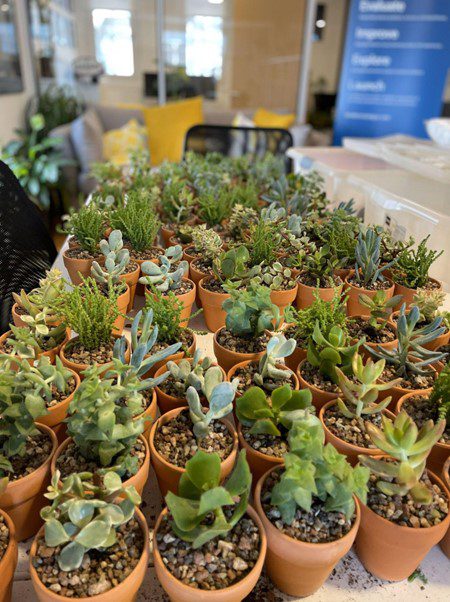
User-centricity in action: Thoughtful presentation and customisation
The final consideration we made was for how the plants would be displayed and given away to attendees. This is where our user-centricity really shined. We had to consider that some attendees would be locals who were attending for only one day while some others were from out of town and would be attending the full three days and travelling home by car, train, or plane. As such, we purchased small wooden plant labels where attendees would be able to mark their names and set their chosen plants aside to pick them up at the end of their last day. We also supplied a variety of markers so people could decorate their pots and add their own personality to them. Finally, we repurposed some packaging material we had received to use as carrying pouches for those who were travelling and needed to be able to throw the plant in their bag or not have soil spilling around their cupholders.
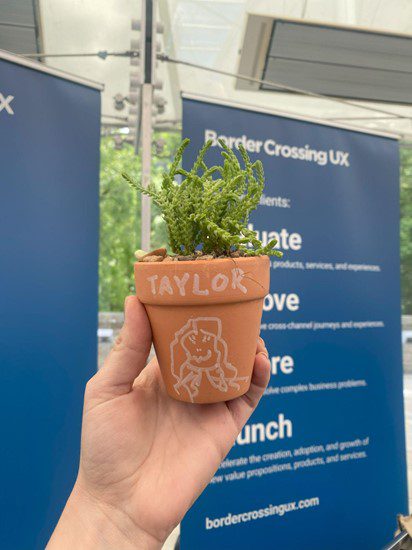
Delighting attendees and amplifying our brand
As the conference arrived and we set up our stand with all the plants displayed, we knew we had made a great choice. Not only did the plants have a massive amount of visual impact, people were directly drawn to the greenery and the unique idea behind it.
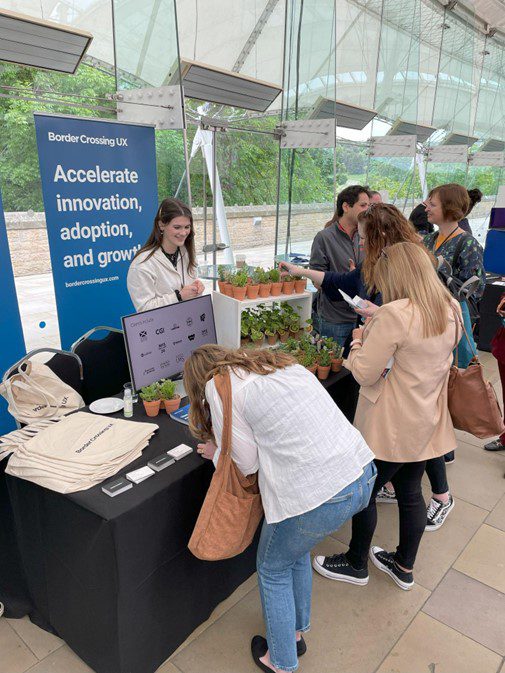
In fact, one of the most common questions we received from attendees was “Why did you choose to give away plants?” As we explained the story behind it and also provided attendees with care instructions (and reassurance that succulents are very beginner friendly), the majority of attendees proceeded to claim a plant of their own. These conversations also proved to be great icebreakers that had people share their experiences with plants or their intention to gift them to someone they cared about.
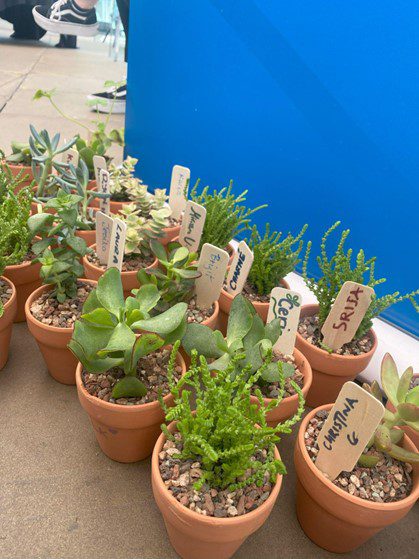
Exceeding Expectations
Overall, we gave away 280 succulents and geraniums over the course of four days and resulted in far more interactions, as even those who didn’t want a plant were still intrigued by the thinking behind them.
We also were able to amplify our impression as a sponsor, receiving shoutouts for our plants during keynote talks and the closing talk when people were reminded to stop by our stand to pick up their plants. Most of all, we loved seeing attendees carry their plants around with pride and even evangelising to other attendees about the pickup process. The plants also created networking opportunities of their own, as they were an easy conversation starter and even sparked discussions about environmental practices in business.
Lessons learned and our sustainable future
By the end of the conference, we were proud to have:
- Exceeded our sponsorship goals
- Put our conversations around sustainability into action
- Tested a risky idea
- Made a positive impact.
We will continue to learn from this process as we continue with this give-away at the upcoming conferences were sponsoring:
Lean Agile Scotland – https://leanagile.scot/ – 13th – 15th September 2023
Service Design in Government – https://govservicedesign.net/ – 20th – 22nd September 2023.
The experience taught us that sustainability doesn’t have to be sacrificed for business success; it can be woven into the fabric of everything we do, including thoughtfully delighting our customers and partners.